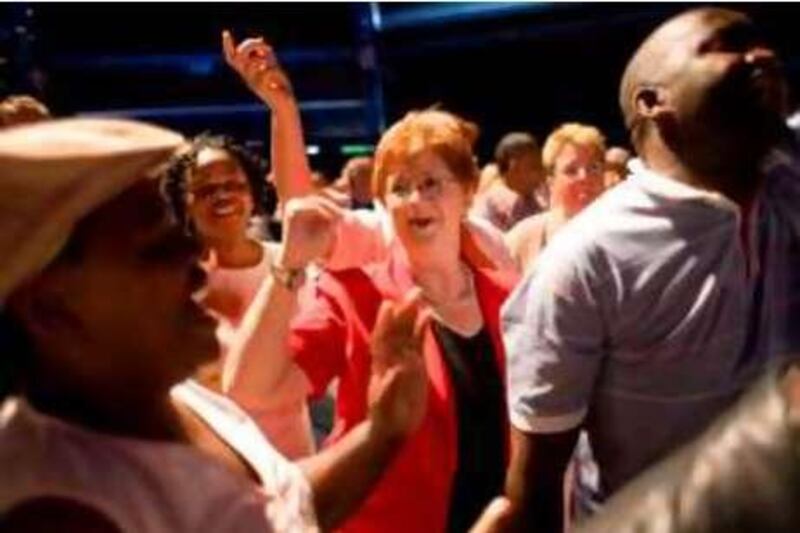JOHANNESBURG // On stage, her arms over the shoulders of two black party officials, the middle-aged white woman kicked her legs in the air as her supporters chanted deliriously in Zulu. "Helen Zille is coming!" they cried. "She's ascending to the presidency!" South Africa's Democratic Alliance (DA), the largest opposition party to the ruling African National Congress (ANC), relaunched itself this month, proclaiming that it stood for "One Nation. One Future" and was now a multiracial party of government. With a slick audiovisual presentation of South Africans of all colours and various languages announcing their dreams for the country, the event was short on policies and specifics, and long on ideals and emotions. "After a bright start the light in the eyes of the people of the rainbow nation is fading," the video said. "It's time for change." With the ANC government repeatedly accused of failing to deliver material improvements to millions of South Africans, and crime remaining at eye-watering levels, the situation should be grist for the mill of opposition parties. "We can overcome our past," Ms Zille, the DA party leader, told the crowd. "We can turn South Africa into a safe, prosperous, free society. We love our rainbow people in all their glorious diversity. They are our inspiration and our hope." But in reality, the DA, despite the mostly black audience at the relaunch, is seen among most South Africans as the representatives of white suburban homeowners and other minorities in a black-majority country, and is a very long way from forming a national government. Chesrae, one of the speakers on the recording, illustrated the challenge the DA faces only too well when he said: "My dream is people stop voting just for race and start voting on what's best for the country." Even Joe Seremane, the party's national chairman, said: "My cherished hope for this country is that one day South Africans will look each other in the eye and see each others' human dignity, not their race or gender or culture or ethnicity but their human dignity." The fact that such sentiments are expressed as hopes and dreams says perhaps more about the country than the organisation itself would like. As the spectators performed a toyi-toyi, the dancing march of militant township dwellers under apartheid, amid shouts of "Viva!", the event looked more like an ANC gathering than anything else. "This is the DA attempting to go black," said Karima Brown, political editor of Business Day. "But you have to do more than toyi-toyi to show you are a black party." The Democratic Alliance is the successor to the Progessive Party, which was the bastion of white liberal opposition to apartheid. In the years after the advent of democracy, though, it absorbed many elements of the National Party that created the racist system, and in 1999, five years after the ANC took power, it fought a general election under the ambiguous slogan "Fight Back". "Politics in this country is about identities," said Steven Friedman, director of the Centre for the Study of Democracy. "I don't think we are going to move away for a long time from the politics of identity, and the DA is identified with a minority." Most voters, he said, saw it as "alien, these people come from somewhere else. It's got more than a mountain to climb. There's no convincing situation in this country I would imagine in the next few decades in which the DA could become a serious contender for national power." It was "delusional" if it thought otherwise, and its best hopes were either to emulate the Liberal Democrats in the United Kingdom, articulating a certain constituency's concerns in parliament, or to hope that divisions in the ANC open the way for it to secure coalition roles at the provincial level. While the South African political firmament is riveted by the split in the ruling party, with its former chairman creating a new Congress of the People, Prof Friedman warned that there was a possibility it could even take a section of the DA vote if it was seen as a more plausible alternative to the government. "If the DA imagine this is going to produce a groundswell of black voters, they are going to be sorely disillusioned." Ms Zille, though, insists that the development represents a historic opportunity. "It legitimises a choice other than the ANC for the vast majority of black voters," she said. "It enables people to realise they are not bound by history to vote for the same party. "There's a realignment happening in South African politics. The political reality is changing, that's what's so exciting." Barack Obama's election in the United States is another factor kindling the DA's hopes. At one point the audience even erupted into a spontaneous chorus of his campaign slogan: "Yes we can!" "Race is still a huge barrier in South Africa," said Ms Zille, 57, who is mayor of Cape Town and was declared the world's best mayor last month by City Mayors, a global local government think-tank. "It has been in the US for 221 years." But the centuries it has taken the world's "melting pot" to elect a leader from an ethnic minority do not dim Ms Zille's ambitions. "Politics is about choice and political philosophy, and race is not a political philosophy," she said. "Values are more important to our future than skin colour. "We have to find a way of transcending our history and bringing people together on the basis of values and policy. We will do it far quicker than the 221 years it took the US." sberger@thenational.ae
Party has high hopes for 'rainbow nation'
South Africa's Democratic Alliance, a party still associated with white suburbanites, relaunches as a multiracial political alliance.

Editor's picks
More from the national




